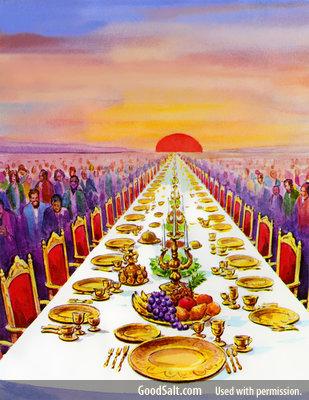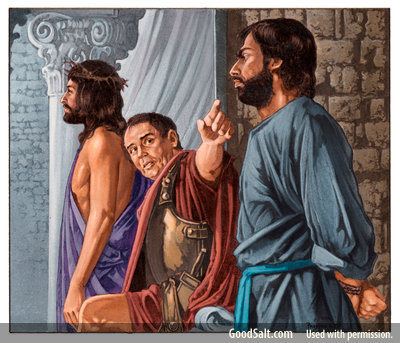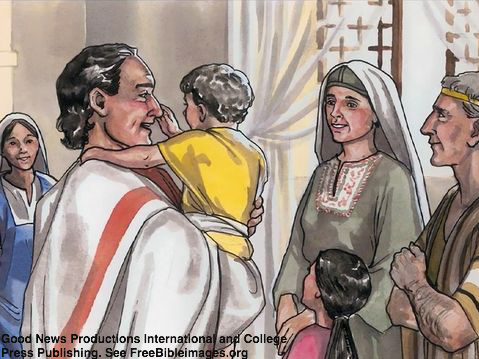Inspired by a true story, the movie Rugged Gold is about a pregnant newlywed named Martha Martin who is separated by an earthquake from her son and miner husband in 1950s Alaska. This is a story about survival – staying alive under horrible circumstances. Martha Martin overcomes severe injuries, delivers her own baby, faces off with a Grizzly and wins, and endures a brutal winter with the hope of being reunited with her son and newlywed husband. Martha did everything she could to keep herself alive.
As we face all kinds of challenges this year including COVID-19 and social unrest revolving around the color of a person’s skin, it is essential that we as Christians be willing to do whatever it takes to keep our faith alive.
But how does a Christian do this? How does a believer in Jesus Christ keep their faith alive and energized? Turn to James 2:14-26 and find out. Many people have understood James 2:14-26 to teach that good works are necessary for eternal salvation. These verses are misunderstood by some to be written to professing Christians whose faith must be tested to see if it is genuine. But James is not addressing the eternal destiny of his readers because they are genuine Christians. James describes them as… “brethren” (James 1:2, 16, 19; 2:5, 14; et. al.), those who are “born from above” (James1:17-18), and those who “hold the faith of our Lord Jesus Christ” (James 2:1). James understands, however, that it would be easy to downgrade works where it was taught that justification before God was by faith alone in Christ alone.
Although these were genuine Christians, they were immature and disobedient (cf. James 3:1-5:6), and they were in danger of experiencing both the damaging consequences of sin now (James 1:15-16, 21; 5:19-20) and an unfavorable evaluation at the Judgment Seat of Christ in the future (James 2:12-13; 5:7-9). To preserve their souls/lives from the ruin of sin now and a negative assessment at the Judgment Seat of Christ in the future, they are to obey God’s Word (James 1:21-25). So James is writing to them to help them put their faith into action – to keep their faith alive.
How do we keep our faith alive in these uncertain times?
1. GET INVOLVED WITH OTHERS (James 2:14-17). “What does it profit, my brethren, if someone says he has faith but does not have works? Can faith save him?” (James 2:14). This verse has caused a lot of concern for many people over the years. Martin Luther was so distraught over this verse that he wanted to take the book of James out of the Bible because he felt it contradicted the great truth that led to the Reformation – Paul’s justification by faith alone apart from works. Clearly, James makes works a condition for salvation as the question, “Can faith save him?” (James 2:14b) expects a negative answer. “Of course, faith without works cannot save him.” James says a faith without works cannot save you.
But the apostle Paul says a faith with works won’t save you. “Now to him who does not work, but believes on Him who justifies the ungodly, his faith is accounted for righteousness.” (Romans 4:5). “For by grace you have been saved through faith, and that not of yourselves; it is the gift of God, not of works, lest anyone should boast.” (Ephesians 2:8-9). Paul and James seem to contradict each other. James says you cannot be saved without works. Paul says you cannot be saved by faith with works.
The reason James and Paul differ with each other is because they are talking to two different groups. When Paul is talking to sinners about how to become a saint, he says it is by faith alone apart from works (Romans 4:5-6). But notice who James is talking to. Christians or non-Christians? “What does it profit, my brethren, if someone says he has faith but does not have works? Can faith save him?” (James 2:14). Notice the phrase, “My brethren…” These people are brothers in Christ. They are saved from hell. So when James talks to saints about how to experience the God who has already saved them from hell, he says it by faith with works (James 2:14-26). If you want to know how to get to heaven, read Paul. If you want to know how to bring heaven to earth because you are already saved from hell, read James.
So do works have any part in getting us to heaven? No. Faith in Christ alone is the only basis of eternal salvation from hell. Eternal salvation is a gift, not of works lest anyone should boast. No person can take credit for his salvation from hell because it is apart from works. “And if by grace, then it is no longer of works; otherwise grace is no longer grace. But if it is of works, it is no longer grace; otherwise work is no longer work.” (Romans 11:6). If works are made a condition for getting to heaven, then eternal salvation can no longer be said to be attained by grace. So James cannot be talking about eternal salvation by grace because God’s Word does not contradict itself.
So what kind of salvation is being addressed in James 2:14? Faith without works cannot save us from what? The word “save” (sozo) in the New Testament doesn’t always refer to salvation from hell. In fact 70% of the time the word “save” in the New Testament refers to deliverance from circumstances. For example, when Jesus’s disciples were about to drown in the midst of a storm at sea, they said to Jesus, “Lord, save us! We are perishing!” (Matthew 8:25). They were referring to being saved from physical death. In I Timothy 2, when Paul was talking about the role of men and women in the church, he said, “Nevertheless she will be saved in childbearing if they continue in faith, love, and holiness, with self-control.” (1 Timothy 2:15). The context is talking about women being restricted from teaching or leading men in the local church. So Paul is talking about women being saved from this restriction through childbearing, that is, she is able to teach and lead her children and be fulfilled doing so if her children continue in these godly virtues.
What James is telling us is that faith without works will not save us from what he has already discussed in the book. First, faith without works won’t save us from A LIFE RUINED BY SIN. James 1:19-22 says, “19 So then, my beloved brethren, let every man be swift to hear, slow to speak, slow to wrath; 20 for the wrath of man does not produce the righteousness of God. 21 Therefore lay aside all filthiness and overflow of wickedness, and receive with meekness the implanted word, which is able to save your souls. 22 But be doers of the word, and not hearers only, deceiving yourselves.” James tells the saved how to save their souls from a life ruined by sin. They must be doers of the word and not merely hearers.
James warns his readers, “Then, when desire has conceived, it gives birth to sin; and sin, when it is full-grown, brings forth death.” (James 1:15). If believers pursue sin long enough and hard enough, it will ruin their lives and the lives of those around them. So the way to be saved from a life ruined by sin is to do what God says to do.
Secondly, faith without works will not save us from AN UNFAVORABLE JUDGMENT AT THE JUDGMENT SEAT OF CHRIST. “12 So speak and so do as those who will be judged by the law of liberty. 13 For judgment is without mercy to the one who has shown no mercy. Mercy triumphs over judgment.” (James 2:12-13). The Bible tells us that all Christians will appear before the Judgment Seat of Christ after they die or are raptured to have their Christian lives evaluated to determine what if any rewards they will receive (Romans 14:10-12; I Corinthians 3:8-15; 2 Corinthians 5:9-11). If we are critical and merciless toward people now, then God will show less mercy to us when He judges our lives in the future. So can faith alone save us? No, James says faith without works cannot save us from a life ruined by sin or from an unfavorable judgment in the future at the Judgment Seat of Christ.
James then gives an illustration of this. “15 If a brother or sister is naked and destitute of daily food, 16 and one of you says to them, ‘Depart in peace, be warmed and filled,’ but you do not give them the things which are needed for the body, what does it profit?” (James 2:15-16). Just as words of assurance from some ungenerous believer cannot save his naked and starving Christian brother or sister from physical death, so too, faith without works cannot save our lives from the consequences of sin. Correct beliefs, such as Jesus is God, the Bible is God’s inerrant Word, or salvation is by grace through faith alone in Christ alone, cannot save us from a life ruined by sin any more than warm wishes will save a needy brother from physical death.
You can have accurate theology and be useless to God and others. There are Christians who have sound theology but they are useless to God! They can dot their i’s and cross their t’s but they are not seeing their souls saved from the power of sin. They are not seeing their lives transformed by the grace of God. Why? Because their orthodoxy has not become orthopraxy. Because they are not putting their faith to work. Sometimes we say, “I’m waiting on God.” But could it be that God is waiting on you? If we want to keep our faith alive in these uncertain times, we must go beyond the well wishes and desires to help others and actively get involved with them.
For example, we can say, “I love people of all colors,” but if we are not actively getting involved with people from other cultures or ethnicities, we are not demonstrating the truth of our words. Our faith will not grow in this area if we are merely hearers and not doers.
Notice that James is talking about helping a needy Christian “brother” in these verses. He is not talking about giving handouts to some stranger who is begging for food or clothing. We are to give priority to believers first. This was especially true in James’s day when Christians were actively being persecuted by the Roman government. We need to balance this with other Scripture. Galatians 6:10 says, “As we have opportunity, let us do good to all, especially to those who are of the household of faith.” Second Thessalonians 3:10 says, “For even when we were with you, we commanded you this: If anyone will not work, neither shall he eat.” Free food (or clothing or money, etc.) should not be given to those who can work but choose not to. To do so rewards laziness and irresponsibility. God wants us to get involved in needy peoples’ lives, starting with the church.
If you are feeling down, one of the best ways to get picked up is to focus on the needs of other people. Just talking about it isn’t going to benefit the needy people in your church or community. We must put our faith into action. The more you get involved with needy people, the stronger your faith will become in the Lord.
Look at what James says next, “Thus also faith by itself, if it does not have works, is dead.” (James 2:17).Faith without works is a “dead” or useless faith that has lost its fervor or fire for Christ. Faith without works is dead – useless, unproductive just as idle words are useless to a brother or sister in need.
If all we ever do is talk about reaching and teaching people for Christ, but we never act on it, then our faith becomes useless to others. Reaching and teaching people for Christ is what the United States of America needs more than anything right now in the midst of these troubling times. Until people obtain peace with God through faith in Jesus Christ (Romans 5:1), they are not going to have peace with themselves or other people regardless of the color of their skin (cf. Ephesians 2:8-18).
A dead faith means the believer has lost his fire or fervor for Christ. If I were to visit another church and upon leaving I said to my wife, “This church is dead,” I’m not saying there are no born-again Christians there. I am saying that church is not on fire for Christ. Our faith won’t do anyone any good if we don’t exercise it.
What does a dead body and a dead faith have in common? Both are immobile and inactive. They also tend to decay and stink. If we fail to do good works, our faith will lose its vitality, it will weaken, and eventually decay and stink. Like a dead car battery, it is useless. It was once alive, but it has become dead or useless due to a lack of use. But the way to jump start a dead faith is to put it to work.
In James 2:18-19, James encounters a skeptic. This skeptic insists that there is no connection between faith and works in order to justify his carnal lifestyle (James 2:18-19). This skeptical person objects to James’s view of faith and works by saying it is absurd to see a close connection between faith and works. “But someone will say, “You have faith, and I have works.” Show me your faith without your works, and I will show you my faith by my works.” (James 2:18). In other words, this person says, “Let’s say you have faith and I have works. You can no more start with what you believe and show it to me in your works, than I can start with my works and show what it is that I believe.”
Then in James 2:19 the objector tries to illustrate that there is no connection between faith and works, “You believe that there is one God. You do well. Even the demons believe—and tremble!” (James 2:19). The skeptic is saying that the demons believe in the oneness of God, the same way James does, who does good, but they only tremble instead of doing good. He is saying that faith cannot be made visible in works! Why would someone argue this way? Because his beliefs are not supported by his behavior. “Faith and good works are not related to each other so don’t criticize me if I don’t practice what I preach.”
Some use James 2:19 to say that believing in Christ is not enough to be saved from hell because the demons believe in God, but are not saved because they have not submitted to God or obeyed Him. Let me point out some things to note about James 2:19:
1. Jesus did not die for demons, He died for people (Romans 5:8; Hebrews 2:16). Therefore, demons are not savable. Demons are unsaved because they willfully rebelled with Lucifer against God (Isaiah 14:13-15; Ezekiel 28:11-19) and are condemned to everlasting fire in hell prepared for the devil and his demons (Matthew 25:41), not because they lack insufficient faith. Nowhere in the Bible does God offer demons eternal life because demons are not savable.
2. Belief that God is one is not saving. What makes faith saving is the object of faith, not the amount or duration of faith. Demons do really believe there is only one God, but believing that God is one does not get anyone to heaven. There are many world religions and cults that believe God is one, but you will not see them in heaven because they have missed the object of saving faith – believing in Jesus Christ alone, who died for their sins and rose from the dead, to give them everlasting life (I Corinthians 15:1-6; John 3:14-18; 6:47; 14:6 20:31; Acts 4:10-12). What makes saving faith saving, is the object, not some special kind of faith. Not all facts about God are saving. Believing in Christ for eternal life is a saving fact. Believing that God is one is not a saving fact.
3. Since the words of James 2:19 belong to a skeptic, they should not be used to prove such an important theological point. Using this verse to dismiss the use of the word “believe” in gospel presentations misunderstands the author’s intended meaning and leads to misapplication.
The second way to keep your faith alive in uncertain times is to 2. GIVE GOD YOUR OBEDIENCE (James 2:20-26). In James 2:20-25, James refutes the skeptic’s arguments by referring to two supreme examples of faith’s connection with works. The way to fire up a Christian’s faith is to PUT IT TO WORK like Rahab and Abraham put their faith to work and were justified before men (James 2:23-25). “But do you want to know, O foolish man, that faith without works is dead?” (James 2:20). James reaffirms that faith without works is dead or useless. The issue is that your faith is unproductive. The Lord is pleading with us in this passage to put our faith in gear and move out! Don’t sit back on the fact that you are saved forever and God’s never going to kick you out of His family, and therefore you become a lazy Christian.
He then states that Abraham was justified by works. “Was not Abraham our father justified by works when he offered Isaac his son on the altar?” (James 2:21). It was well known to James and his readers that Abraham was justified before God by faith alone (Genesis 15:6) about thirty years before he offered up Isaac (Genesis 22). His justification before God was apart from works (Romans 4). If Abraham had failed to obey God in offering up Isaac, would he have remained justified before the Lord? Yes, because justification before God is always based on faith alone, not good works whether before, during or after your conversion. “5 But to him who does not work but believes on Him who justifies the ungodly, his faith is accounted for righteousness, 6 just as David also describes the blessedness of the man to whom God imputes righteousness apart from works.” (Romans 4:5-6).
James goes on to say in “Do you see that faith was working together with his works, and by works faith was made perfect?” (James 2:22). Abraham’s original justifying faith was strengthened and matured by his act of obedience in offering up Isaac. How? His faith grew from a conviction that God could overcome his inability to have children to the assurance that God could actually resurrect his son’s own body from physical death. Hebrews 11:17-19 says, “17 By faith Abraham, when he was tested, offered up Isaac, and he who had received the promises offered up his only begotten son, 18 of whom it was said, ‘In Isaac your seed shall be called,’ 19 concluding that God was able to raise him up, even from the dead.”
James continues, “And the Scripture was fulfilled which says, ‘Abraham believed God, and it was accounted to him for righteousness.’ And he was called the friend of God.” (James 2:23). Abraham’s original justifying faith before God was “fulfilled” or “filled-full” of meaning as a result of this act of obedience. His obedience revealed his faith to men. The Scriptures were fulfilled in that Abraham showed his faith by his works. His obedience justified him before men in such a way as to show him to be righteous on a practical level. People could say Abraham was a “friend of God.” Friendship with God requires obedience. Jesus said, “You are My friends if you do whatever I command you.” (John 15:14). Jesus was speaking to the believing disciples when He spoke these words in John 15. They were already saved. This is why James 2:24 speaks of two kinds of justification.
“You see then that a man is justified by works, and not by faith only.” (James 2:24). The word “only” is an adverb and modifies the verb “justified” implied in the second clause. Thus it could be translated, “You see then that a man is justified by works, and not only (justified) by faith.” There is a justification by works and a justification by faith. Justification by works is before men. “For if Abraham was justified by works, he has something to boast about, but not before God.” (Romans 4:2). People can be justified by works, but not before God. Why? Because God can see faith without works. He knows life is there apart from our works. This is why justification before God is by faith alone in Christ alone (Romans 4:5; cf. Genesis 15:6). But people cannot see faith apart from works. Hence, justification by works is before men, justification by faith is before God. James never speaks of justification by faith and works. He doesn’t say Abraham was justified by faith and works at the same time, nor does he say Rahab was.
“Likewise, was not Rahab the harlot also justified by works when she received the messengers and sent them out another way?” (James 2:25). The story is clear. The Israelites were going to take Jericho. The Jewish spies came in to spy out the land. Rahab, “the harlot” – the prostitute, the hooker, the whore – the woman who lived a life of failure – hid them and then secretly sent them out so they could escape. Rahab’s physical life was saved because she had works. God saw Rahab’s faith when she “received the spies” (Hebrews 11:31). But men could not see her faith until she acted on it by “sending them out another way” (James 2:25b). Rahab was truly a friend of God because she was their friend. While all of Jericho perished under God’s judgment, Rahab lived because her faith lived! So yes, faith can be shown to men from our works. Abraham did it and was called the friend of God. Rahab did it by sending the spies away safely.
We are called to act upon the faith that we have. We can know what is right. We can already be saved from Hell. We can come to church two or three times a week. We can be on our way to heaven and yet not experience heaven as a part of history! Until we act upon the Word of God and start living it out, what does it profit? Faith without works will not profit a brother or sister in need of food or clothing nor will it profit the Lord at the Judgment Seat of Christ.
“For as the body without the spirit is dead, so faith without works is dead also.” (James 2:26). James compares faith to the body and works to the spirit. When does a human body die? When it loses its spirit which keeps it alive. When does a Christian’s faith die? When he stops using it. Like a muscle, if you stop using it, it atrophies and withers away. You won’t experience the transforming power of God if you stop putting your faith to work! Just as the human spirit gives life to the body, good works give life to your faith (James 2:26). You can have correct belief and lots of Bible knowledge, but if you stop acting on that belief and knowledge, your faith will weaken and become a creedal corpse.
A little girl who really believed in prayer, had a brother who made a trap that caught little sparrows, and she prayed that it would fail. Suddenly, for three days her face was radiant when she prayed and her absolute faith in the futility of the trap was so noticeable that her mother asked, “Julia, how can you be so confident?” Julia smiled, “Because, dear Mama, I went out three days ago and kicked that trap to pieces.” She literally put her faith to work.
If we are going to keep our faith alive in these uncertain times, we must put it to work. Not by kicking traps, but by meeting the felt needs of the people God is calling us to reach – by introducing them to Christ and by discipling them and sending them out to do the same. We can decide today how we will live our lives in these chaotic times. Will you choose to keep your faith alive and vigorous by putting it to work in obedience to God? God wants our faith to thrive, not die. What about you?
Prayer: Precious Lord, this message really cuts deep into my apathetic heart. My knowledge of the truth can grow greatly, but if I do not put it into practice, my faith becomes dead or useless to You and to others. No wonder I have lost my fervor for You Lord Jesus. My head is swollen with Bible knowledge, but my heart is cold because I have not applied what I already know to be true. This world would be a much better place if all Christians would put what they know into practice. Lord, I want to be a part of the solution to the world’s problems by putting my faith to work. It is so easy for me to sit back and criticize others for doing very little while I, too, talk about faith more than I live it out. Forgive me, Lord, for being preoccupied with myself and what I know to be true instead of putting it into practice. Please show me whom You want me to get involved with so they can benefit from my relationship with You and come to know You as their Savior. In Jesus’s name. Amen.









